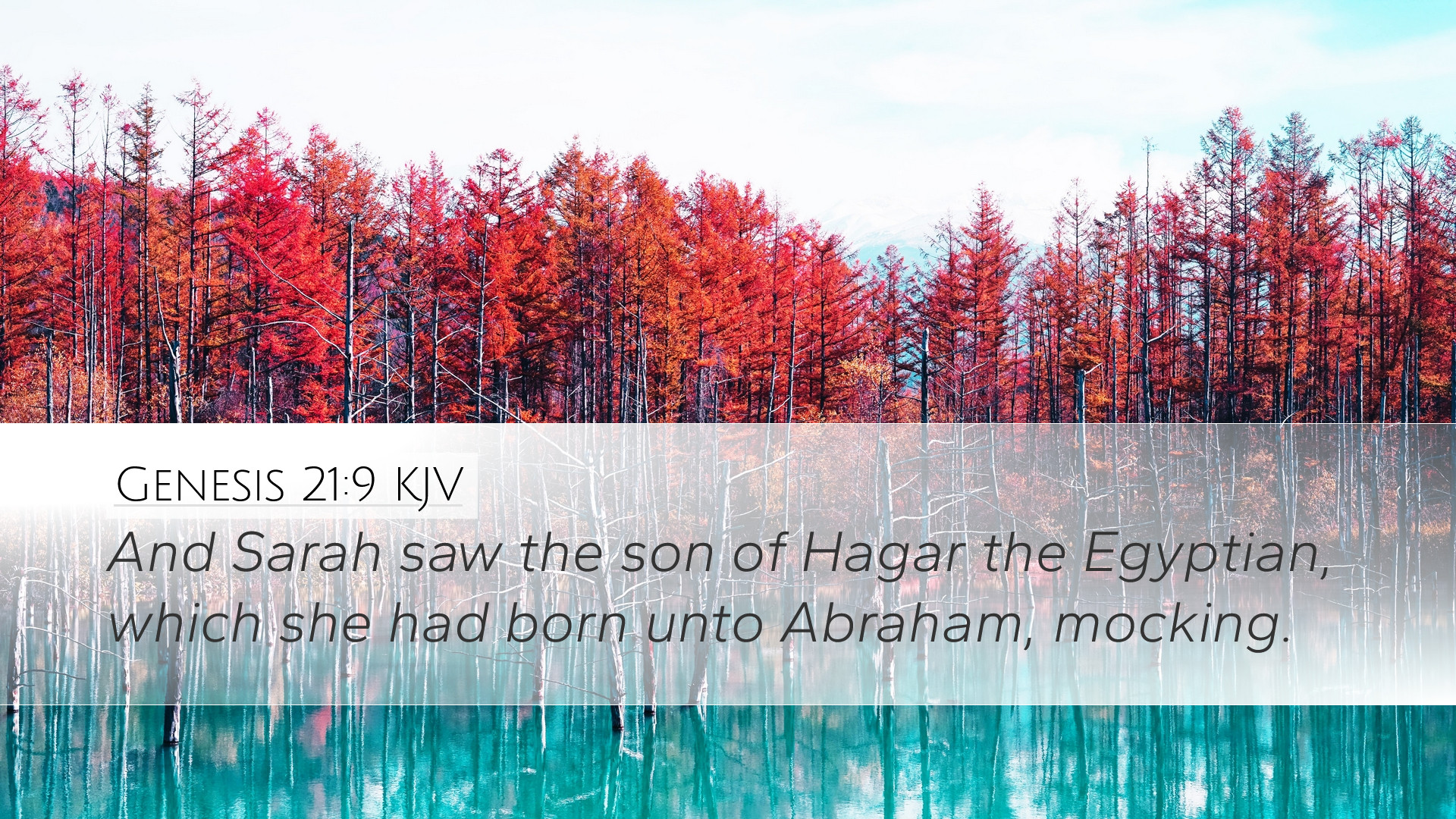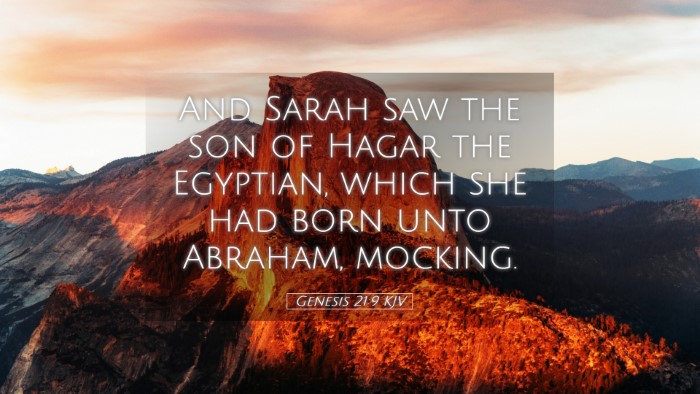Commentary on Genesis 21:9
Verse: "But Sarah saw the son of Hagar the Egyptian, which she had borne unto Abraham, mocking."
This verse captures a pivotal moment in the narrative of Abraham and Sarah, highlighting themes of familial conflict, jealousy, and divine promise. The tension between Sarah and Hagar is illustrative of larger spiritual truths regarding faith and the fulfillment of God's promises.
Contextual Background
The conflict arises in the broader context of the Abrahamic covenant, where God promised Abraham and Sarah a son through whom the covenant would be established (Genesis 17:19). Prior to the fulfillment of this promise, Sarah, in her impatience, gave her maid Hagar to Abraham to bear him a child (Genesis 16:2). This action, born out of doubt regarding God's timing, led to the birth of Ishmael, who is now seen as a source of contention.
Analysis of Key Themes
1. The Mocking of Ishmael
The term "mocking" (Hebrew: tzachaq) can imply various forms of derision, laughter, or even scorn. Scholars such as Matthew Henry suggest that this mocking may denote a form of contempt directed towards Isaac, the child of promise. This interpretation signals deeper implications about the relationships within Abraham's household, where the sons of different women are pitted against each other.
2. The Role of Sarah
Sarah's reaction to Ishmael's mocking is critical. Her response indicates her protective nature over Isaac, the child born of the covenant. Albert Barnes remarks on the importance of Sarah's role, emphasizing that she represents divine order, as opposed to the chaos that ensued from her earlier decision to involve Hagar. This conflict underscores a struggle between the flesh (Ishmael) and the spirit (Isaac), which resonates throughout the scriptural text.
3. Themes of Jealousy and Conflict
The narrative reveals the human propensity towards jealousy and conflict. Adam Clarke notes that Sarah's actions, fueled by maternal instinct and feelings of inadequacy, manifest the often painful consequences of striving against God's timing. The ensuing conflict invites readers to reflect on their own experiences of jealousy and the disruption it can bring to relationships.
4. Divine Sovereignty
Despite the domestic tensions, God's sovereign plan unfolds with certainty. The tensions introduced by Sarah's actions do not derail God's ultimate purpose. This stands as a reminder that God's promises are not thwarted by human failures or familial strife. Matthew Henry observes that the conflict ultimately leads to God's intervention and reaffirmation of His covenantal promises.
Theological Implications
1. Understanding God's Promises
This text calls congregants and scholars alike to reflect upon the nature of God's promises. God's timing may not align with human expectation, yet His faithfulness remains steadfast. Albert Barnes encourages believers to trust in God's overarching plan, as He often works through human difficulties to fulfill His purposes.
2. Freedom and Bondage
In the New Testament, this passage serves as an allegory for the tension between the covenant of grace and the covenant of works (Galatians 4:21-31). Paul uses the figures of Hagar and Sarah to illustrate the difference between living under the law and living in the freedom that comes through faith in Christ. Adam Clarke emphasizes this transition, urging his readers to recognize their identity as children of the promise, liberated from the bondage of the law represented by Ishmael.
3. The Nature of Rivalry
The tension represented in this verse serves not only as a historical account but also as a mirror reflecting the ongoing struggles within human relationships. The rivalry between Ishmael and Isaac extends into the present, symbolizing the spiritual conflict faced by believers. Understanding this rivalry invokes a call for unity in the body of Christ, moving away from discord towards reconciliation.
Pastoral Applications
1. Addressing Jealousy in the Church
This narrative serves as a cautionary tale regarding jealousy in pastoral ministry and church life. Pastors are reminded to address issues of rivalry among congregants, teaching that God's promise creates unity rather than division. Matthew Henry emphasizes that jealousy can lead to significant strife, urging leaders to foster an environment of grace and love.
2. Impatience with God's Timing
The story of Sarah and Hagar reminds believers of the dangers posed by impatience. Waiting on God's timing can be challenging; however, it is crucial for spiritual growth and maturity. Pastors can encourage their congregations to seek patience in their faith journeys, assured that the fulfillment of God's promises is always worth the wait.
3. Embracing Our Identity
This passage invites believers, especially women, to embrace their identity as children of the promise. Just as Sarah eventually rejoiced in her role as the mother of Isaac, women today are called to find fulfillment in their identities within God's family. The affirmation of their worth found in Christ is vital for their spiritual development according to the teachings of Albert Barnes.
Conclusion
Genesis 21:9 serves as a profound reminder of the complexities of human relationships woven into the grand narrative of God's redemptive plan. The insights drawn from public domain commentaries illuminate the interplay of faith, promise, and the consequences of human actions. For pastors, students, theologians, and scholars, this passage not only provides a historical account but speaks to ongoing themes of grace, patience, and identity in Christ.


